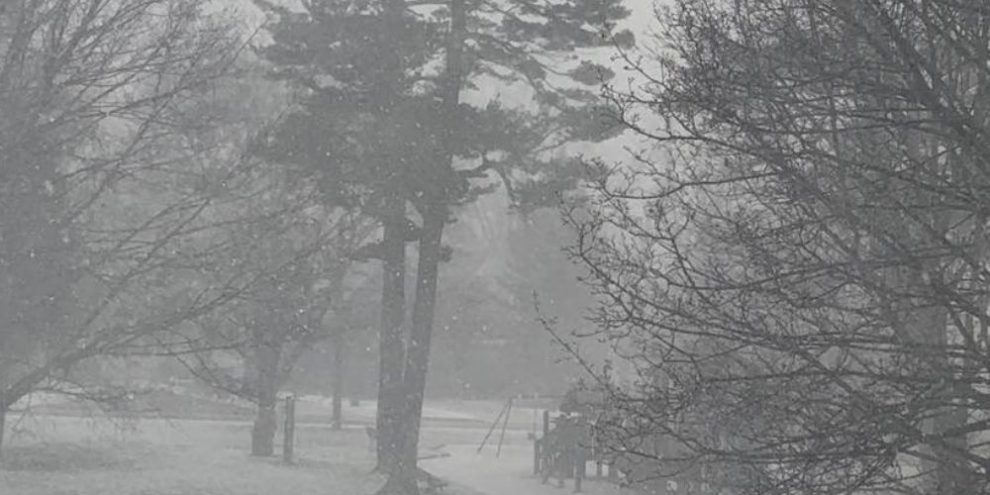
A buffet of weather watches and warnings have been issued for southern Ontario in anticipation of a major winter storm that is to begin Thursday evening.
Environment Canada meteorologist Steven Flisfeder says there is a multitude of potential hazards with this storm.
In the Barrie area, the storm is expected to start as snow or rain and then transition to all snow by Friday.
"Precipitation is expected to begin as snow or rain this evening (Thursday). Temperatures are expected to plummet on Friday morning leading to a potential flash freeze. Rapidly falling temperatures will be accompanied by strong winds along with snow, heavy at times. Extensive blowing snow will develop Friday morning. Very cold wind chills are expected to develop on Friday and persist into the weekend," Environment Canada said.
Flisfeder says it's that high variability that makes all these factors combined into a very hazardous storm.
The storm is also a concern because so many people have plans to hit the road for the Christmas break.
"It's really the visibility reductions with blowing snow that is a concern through Friday," says Flisfeder.
Barrie could receive 5 to 10 cm of snow on Friday that will be blown around by wind gusts to 90 km/h creating hazardous travel conditions, then another 10 cm on Friday night.
Once the system moves off on Saturday, the lake effect snow machine will get cranked up, and toss in a strong wind, and there will be extensive blowing snow with reduced visibility, even in areas that don't get the squalls.
"It could be varying conditions throughout the weekend, so it is hard to say exactly who is going to get locked in (with snow squalls), but everybody is potentially going to be impacted," says Flisfeder.
The wind and local snow squalls are expected to last through Christmas Day Sunday, with blizzard conditions downwind of Lake Huron and Georgian Bay.
Aside from the poor road conditions, the extended wind event and the bitter wind chill are something people need to take into consideration.
"You are looking at potential power outages in a very broad area across southern Ontario, as well as very cold temperatures. So, some very serious conditions ahead for the weekend."
Emergency planners with the County of Simcoe recommend having a 72-hour survival kit ready to go at any time:
Emergency Survival Kit Checklist
- Flashlight and batteries
- Radio and batteries/crank-powered radio
- First-aid kit
- Candles and waterproof matches/lighter
- Extra car and house keys
- Cash in the form of small bills and coins
- Copies of important papers for each member of your family e.g. passport and birth certificate
- Canned foods, energy bars, dried foods (consume and replace at least once per year)
- Bottled water — 2L/person/day for drinking and an additional 2L/person/day for food preparation and hygiene (replace at least once per year)
- Manual can opener, bottle opener
- Cutlery
- Cooking pot
- Disposable cups and plates
- Garbage bags and smaller resealable bags
- Clothing and footwear, one change/person
- Blankets or sleeping bags
- Toilet paper and other personal items
- Alcohol-based hand sanitizer
- Non-latex gloves, dust masks
- Medications (one week supply)
- Backpack/duffel bag
- Whistle
- Basic tools — hammer, pliers, wrench, screwdrivers, etc.
- Small fuel-driven stove and fuel
- Playing cards, games
Basic Car Kit
- Ice scraper and snow brush
- Windshield washer fluid/antifreeze
- Booster cables
- Flashlight
- Water and food (e.g. energy bars)
- Matches and a candle in a deep can or holder
- Extra clothing: hat, gloves, boots
- Emergency blankets
- First-aid kit
- Shovel
- Multi-tool
- Road map
- Cell phone charger
Car Kit – Extra Items
- Sand, salt or kitty litter
- Traction mats
- Tow chain
- Cloth or roll of paper towels
- Warning light or road flares
- Axe or hatchet
- Fire extinguisher
Winter Storm Warning Criteria - Environment Canada
- A warning issued by Environment and Climate Change Canada’s Meteorological Service (MSC) for a major snowfall, or significant snowfall combined with freezing rain, strong winds, blowing snow, and/or extreme wind chill. The mix of these winter weather conditions poses a threat to public safety and property. Winter storm conditions are not necessarily restricted to the winter season, but may occur in the late autumn and early spring as well.
Blizzard Warning Criteria - Environment Canada
- A warning issued by Environment and Climate Change Canada’s Meteorological Service (MSC) for hazardous weather conditions characterized by high winds, and a widespread reduction in visibility due to falling and/or blowing snow.
Blizzard conditions may persist for a period of time on their own or be part of an intense winter storm. In the latter case, a blizzard warning is issued instead of a winter storm or snowfall warning. Blizzard conditions may be accompanied by a severe wind chill making them even more dangerous.





